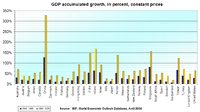
Photo from wikipedia
Abstract Guided by the consequential test validity theory and data use theory (i.e., theory for making a data-driven educational decision), the present study examined the association between the frequency of… Click to show full abstract
Abstract Guided by the consequential test validity theory and data use theory (i.e., theory for making a data-driven educational decision), the present study examined the association between the frequency of kindergarten standardized assessments and children's reading growth from the beginning of kindergarten to the end of first grade. Using the Early Childhood Longitudinal Study – Kindergarten Cohort of 2010–2011, the final sample included 29,568 observations from 7392 children nested in 744 U.S. kindergartens. The findings from multilevel growth modeling indicated that while children on average did not show a faster reading growth rate from taking frequent standardized assessments in kindergarten, the magnitude of the impact varied across subgroups of children. Specifically, Asian children and children of high socioeconomic status (SES) showed a slightly more significant reading growth than that of their peers when they attended kindergartens with frequent standardized assessments. In contrast, Hispanic, Black, other races/ethnicities, low SES, children with disabilities, and English language learners did not show significant reading growth, even when they took standardized assessments more frequently in kindergarten. The study concludes with a discussion of the implication of kindergarten standardized assessment policies regarding the consequential test validity and data use theory.
Journal Title: Learning and Individual Differences
Year Published: 2021
Link to full text (if available)
Share on Social Media: Sign Up to like & get
recommendations!